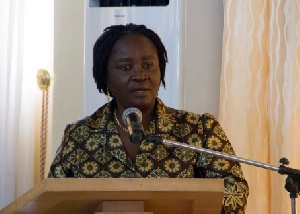Ghana’s Education Ministry believes until the methodology used in the Organisation for Economic Cooperation and Development (OECD) recent school rankings is outlined, it will be erroneous to conclude that Ghana’s education system is poor.
According to a press statement signed by the Education Minister Prof. Jane Naana Opoku-Agyemang, the media must be circumspect with their reportage because the full report is not out yet.
Moreover, she reminded the public, the full report surveyed 195 countries and not 76 as being reported in the media.
“Ghana’s educational system remains robust and we are encouraged by the gains we are making and also by the popular verdict by many independent global assessors.
“This is the country that has successively won the three top awards in the West African Secondary School Certificate Examinations for the last five years. Ghana’s educational system cannot be a failed one neither can it possibly be the worst in the world and it is at least gratifying that the OECD report does not say so,” Prof Opoku-Agyemang stated.
Below is her press statement
The Ministry of Education has taken note of media publications regarding a school ranking on Mathematics and Science at age 15 by the Organisation for Economic Cooperation and Development (OECD) with specific reference to Ghana’s position among 76 countries in the world.
As we wait for the full report to be formally presented at the World Education Forum in South Korea next week to which our Minister of Education Prof. Jane Naana Opoku-Agyemang has been invited, it is important to be circumspect at this stage and to acknowledge that we do not at this point have details on the methodology and the period covered in this first ever OECD report on school rankings.
We have also noted from the press highlights of the research that only 76 countries out of over` 195 countries in the world were considered for this research. It therefore cannot be said that Ghana’s educational system is the worst globally as has been circulated by sections of the Ghanaian media.
Additionally, Ghana is one of only five African countries that feature in this ranking. It will be interesting to explore how these five African countries thus Ghana, South Africa, Botswana, Morocco and Tunisia made it to these rankings. Are we perhaps being told that these are the best performing nations in Africa? What other interpretations exist to justify the inclusion or selection of these African nations and indeed of the entire 76 nation sample frame?
It is worth pointing out that apart from this OECD report, all other recently published international reports have been highly complementary of Ghana’s efforts at improving the quality of Education. For example, the independent United Kingdom think tank, the Overseas Development Institute (ODI) praised the tangible gains Ghana has made in access and quality in its report captioned “Ghana, the Rising Star: Progress in Political Voice, Health and Education” published in March, 2015. The report notes that Ghana ranks among the highest performing countries in human development in sub-Saharan Africa, especially in terms of health and education.
Similarly, the UNESCO Education For All Global Monitoring Report under access reports that Ghana’s progress between 2000 and 2012 surpasses the averages of sub-Saharan Africa, developing countries and developed countries. Ghana’s KG Enrolment Ratio increased by 74 percentage points compared with the sub-Saharan average of 9%, developing countries average of 22% and developed countries average of 13%.
On the goal of ensuring that all children have access to and complete primary education, the performance trends indicate that Ghana is one of the best performing countries in the world.
The 2014 Global Information Technology Report of the World Economic Forum also highlighted signifiant successes and ranked Ghana 46th out of 148 countries in the world in terms of quality of our education system while in the area of Mathematics and Science, Ghana was ranked 2nd in Africa and 62nd in the world.
Meanwhile, it is important to stress that the Government of President John Dramani Mahama has long prioritized the study of Maths and Science not only to improve scores but to make it more attractive and exciting to study whiles targeting improved transition rates. This is the reason Government has been embarking on a number of bold interventions over the last three years including engaging the services of globally renowned mathematicians Prof. Francis Allotey and Prof. Sitsope Anku. Under this intervention, thousands of maths and science teachers are being retrained to meet Government’s objective.
This Government in 2014 met its obligation for the first time in decades when it provided 12 million core English, Maths and Science text books to meet the required textbook-pupil ratio. Over 50,000 computers over the last two years have also been distributed. The Science Resource Centre Programme is being expanded to cover all public Senior High Schools (SHSs) in the country. In 2014, 100 SHSs across the country benefited from this project to improve on the teaching and learning of Science.
Under the 156 million dollars World Bank supported Secondary Education Improvement Project (SEIP) the Ministry is supporting quality improvement in 125 beneficiary SHSs with emphasis on the teaching and learning of Mathematics and Science.
Ghana’s educational system remains robust and we are encouraged by the gains we are making and also by the popular verdict by many independent global assessors. This is the country that has successively won the three top awards in the West African Secondary School Certificate Examinations for the last five years. Ghana’s educational system cannot be a failed one neither can it possibly be the worst in the world and it is at least gratifying that the OECD report does not say so.
Nonetheless, the Ministry of Education is determined to continue to improve the standard of education and put in place measures to ensure quality teaching and learning at all levels of the educational system in our dear country.
Signed, Prof. Jane Naana Opoku-Agyemang
General News of Thursday, 14 May 2015
Source: starrfmonline.com













